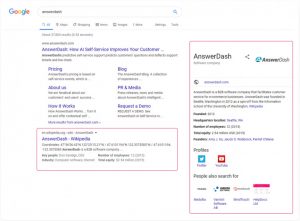Summary
Wikipedia writers disagree about Wikipedia pages for companies, or “Wikipedia business profiles.”
From a business outlook
Small and medium companies that don’t have their own Wikipedia page certainly want one. (Large companies usually struggle with a different issue: to make sure that criticism or bad publicity isn’t the focus of their already-existing Wikipedia articles.)

There are clear advantages to having such a profile. Wikipedia is the most popular content website on the planet, with roughly half a billion visitors per day. Everyone from potential customers to journalists check a businesses’ Wikipedia page for a true, unbiased view of it. In this respect, Wikipedia became like the Better Business Bureau, Rotary clubs, or other community referral systems. Also, once the Wikipedia profile is created, it will be featured on the first pages of every search engine, which define the business by the first few lines of its Wikipedia article.
A Wikipedia profile sends a clear signal of the business’s credibility and notability.
From the Wikipedia community’s standpoint
This all looks different. Wikipedia editors are volunteers who don’t receive a dime for their hard work. Even though their efforts have created such popular and useful content, the public doesn’t even know their names. But Wikipedia writers mostly write about what interests them, and that isn’t usually the business world. Extinct species of squirrels or Medieval French royalty interests more Wikipedia editors than all B2B startups combined.
Also, as a group, Wikipedia writers are different than the general public. The Wikipedia community tends to be more interested in egalitarianism or socialism than capitalism, and of course this impacts what they write about. If you aren’t into capitalism, you may be less interested in business and finance.
In short, many Wikipedia editors see the medium and small businesses that want to create their own Wikipedia pages as a distraction at best—or worse, as trying to use Wikipedia for their own promotion and financial gain.
The difference between what businesses want and how the Wikipedia community feels about them means there aren’t really clear guidelines about creating Wikipedia pages for businesses.
You can’t write a profile about your own business
A business cannot and should not write an article about itself. Not only is it not allowed by Wikipedia policies, it’s simply the wrong way to go about it. The whole point of a Wikipedia profile is to offer a true, objective, third-party report, not a self-serving summary of the company’s official website. It is obvious when a profile is just for promotion, and those pages are deleted, often right away. Writing a Wikipedia article about your own business is a waste of time. And spending at least 40 hours studying Wikipedia rules, manuals of style, formatting, etc. for a single article is not a good use of your time, either.
There are PR companies who will do it for you, but that’s a bad idea
There are services that offer “expert Wikipedia writers,” “professional Wikipedia writers,” “Wikipedia experts”, and so on to create Wikipedia business profiles. The cost of such a Wikipedia profile ranges from hundreds to thousands of dollars. Unfortunately, these service providers typically break Wikipedia’s conflict-of-interest policies, and even Federal law. See the Professional Wikipedia writers page for more detail.
These service providers get found out and banned by the Wikipedia community. A business can spend a few thousand dollars for their profile, only to discover it’s been deleted six months later because the “experts” have been discovered to be breaking the rules, and their pages have been deleted. Really bad examples even find their way into The Wall Street Journal and other media, creating negative publicity for the business instead of the positive effect of a Wikipedia profile.
So, what can a business owner or marketing lead do?
The first step is to make sure the business should have a profile according to Wikipedia policies. You can do that yourself, by studying Wikipedia notability guidelines and their application, or you can use our fundraising program. At Wenard, we deal with notability questions related to companies as we work on our World of Commerce project. Your small donation helps us pay for the research databases we use. Check the notability of your organization.
If you find that your business is not notable, then it will not get its own Wikipedia page. Nothing can or should be done for a while; this would be a waste of everyone’s time, as your work would be deleted. Instead, focus on growing the business and getting more publicity for it. The Wenard check for notability, if negative, will offer a few suggestions.
On the other hand, if your business is notable, it does deserve a company profile. As you cannot create such a profile yourself, and we discourage you from hiring “professional Wikipedia writers,” this seems like a dead end, especially since some Wikipedia editors don’t like articles about companies.
Fortunately, there are some solutions. First, locate businesses like yours that have approved Wikipedia profiles. Check out who wrote these articles (in the “History” tab) and contact them to suggest they write about your company, too. To help, you can offer them media references about your company, and/or images that can be published on Wikipedia. But be careful: never put the editors in the situation of getting a reward if your company’s Wikipedia article is written a certain way. That would violate the conflict of interest policy. Instead, let the editor work on the Wikipedia page independently, creating and publishing a truly independent view of your company.
If this approach doesn’t work, you’re welcome to contact us. We are in contact with many Wikipedia writers, and if your company or organization deserves a profile, we will try to connect you to someone who can help you without violating any Wikipedia rules.





